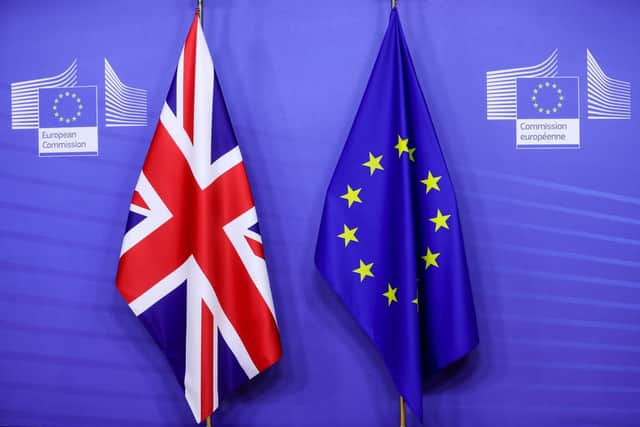Trade war with EU is the last thing the UK needs - Bill Carmichael
But, ridiculous as it seems, that is exactly where we are headed if a compromise cannot be reached in what must be one of the most ludicrous international disputes we have seen for many years.
The seriousness of the economic situation facing not just the UK, but also the rest of the world, cannot be overstated.
Advertisement
Hide AdAdvertisement
Hide AdAccording to figures released by the Office for National Statistics this week, UK inflation reached nine per cent in the 12 months to April, and many economists fear it could go into double figures before the year is out.


Apologising for sounding “apocalyptic”, Andrew Bailey, the Governor of the Bank of England, warned the Treasury Select Committee that the war in Ukraine was pushing up global commodity and fuel prices and that people were facing a “very big income shock”.
Other countries are in exactly the same boat and the approaching economic storm could capsize us all.
At such a time of crisis you would think countries that are close neighbours and military allies would be joining together to find solutions to protect the living standards of all citizens.
Advertisement
Hide AdAdvertisement
Hide AdBut instead the UK and the EU are embroiled in a damaging and petty dispute characterised by Marks and Spencer Chairman, Archie Norman, this week as “pretty pointless”.
At issue is the Northern Ireland Protocol agreed as part of the Brexit deal to avoid a hard border between the Republic of Ireland, which of course is still in the EU, and Northern Ireland.
It was agreed that Northern Ireland would continue to follow some EU rules and that there would be, in effect, a border in the Irish Sea with customs declarations and inspections taking place before goods from Great Britain entered the province. The idea was that goods travelling from mainland Great Britain could be transported to Northern Ireland as seamlessly and painlessly as possible.
But that hasn’t happened because a rigid interpretation of the regulations has turned the whole thing into a bureaucratic nightmare that is damaging trade within the UK and penalising the people of Northern Ireland, who are entirely blameless in this dispute.
Advertisement
Hide AdAdvertisement
Hide AdIn a BBC radio interview Mr Norman explained some of the problems Marks and Spencer faced in transporting goods both to Northern Ireland, and also to its substantial operations south of the border. Each lorry entering the Republic has to carry 700 pages of documentation that takes eight hours to prepare. Some of the descriptors, particularly of animal products, have to be written in Latin, and be in a certain typeface. M&S employs 13 vets in Motherwell to prepare it all, he explained, adding about £30m a year to the company’s costs.
Currently, goods entering Northern Ireland from Great Britain have a temporary “easement” which reduces the paperwork to an extent. But the EU is proposing that the same checks be applied in future.
Mr Norman said: “That means every piece of butter in a sandwich has to have an EU vet certificate, so it is highly bureaucratic and pretty pointless. The purpose of the customs rules is to protect consumers from unsafe food arriving from some far-flung country. But our food standards by law are the equivalent or higher than the EU. So there’s no risk to safety and no purpose to these checks.”
He added that the UK Government’s approach was “a triumph of common sense over a rules based mentality”.
Advertisement
Hide AdAdvertisement
Hide AdAlthough M&S can absorb these costs, for the “small artisan cheese maker or cake baker it would be impossible to export any more”, he said.
The whole thing is absurd. There is absolutely no risk to public safety or to the integrity of the EU’s single market, yet this petty dispute is threatening relations between allies and friends at a time when we need to pull together.
And all this has resulted in instability in Northern Ireland and a threat to the Good Friday Agreement, which has produced peace in the troubled province for the last two decades.
Frustrated by the impasse in negotiations the Foreign Secretary, Liz Truss, introduced a new Bill in the House of Commons this week that is designed to make limited changes to the protocol, such as freeing the movement of UK-made goods from “unnecessary bureaucracy” and regulatory barriers.
Advertisement
Hide AdAdvertisement
Hide AdIn response the EU chief negotiator Maros Sefcovic warned that “unilateral actions are not acceptable” and that the EU would respond “with all measures at its disposal”.
In other words, we could be heading for an entirely unnecessary and preventable trade war, which will damage people’s livelihoods both in the UK and the EU. Surely, it cannot be beyond the wit of politicians from both sides to sort this problem out?